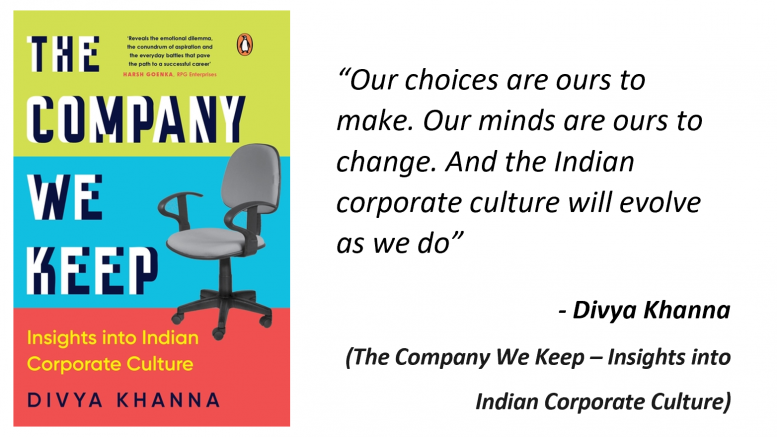How does one describe culture? The definition of culture according to the Oxford Dictionary is “The ideas, customs, and social behaviour of a specific people or civilization.” So, does one person or a group of people define culture? What is culture used for? It influences the way we think and act when we take decisions. How does culture affect how one behaves at work? A healthy workplace culture will enable its staff to collaborate and succeed.
To further address culture, in her book “The Company We Keep,” advertising industry veteran Divya Khanna examines Indian corporate culture through research, interviews, and personal experience. The book outlines the difficulties and some important lessons that leaders and employees (via research) learned prior to, during, and after the pandemic.
What does the book cover?
The book covers stories and struggles of people on ground. How they navigated the challenges they faced in their organisation and the support to got or not from their peers and bosses. The narrative is well researched and sets the tone for the reader. The topics covered include cultural imbalance, gender bias, workaholic culture, lifestyle issues and Shifting goals.
The book has insights shared by leading experts like Ashok Capoor (business analyst), Kalyani Capoor (Psychotherapist), RR Nair (HR consultant) to name a few on human resource, leadership and workspace. Kalyani Capoor has contributed to book with one chapter on arriving at a healthy and holistic definition of success for leaders and individuals.
The research (Quantum) based book resonates with what we see around us. Competitiveness, Burnout, workaholism, stress is all part of the corporate culture. How we navigate around it is in our hands. Is it possible to collaborate and work for a large purpose? The question one may need to ponder upon?
Some interesting insights that I picked up from the book.
- Jugaad @ work: Smart work vs Hard work- Smart work is usually perceived to be for the benefit of oneself to progress in the corporate world and acts as protection against the stresses of overwork and office politics. Jugaad is not a skill. It is a compulsion (Read more in Part 1, Cultural Undercurrents: Chapter 5 .
- Our cultural codes of hard work, sacrifice and competitiveness apply not just to jobs and careers but also to anything else we may choose to do, whether it is looking after a home, other family responsibilities or even our interests and hobbies
- When a leader redefines success, both hers and that of others to include health, relationships, meaning and purpose at work and in life, that she creates an environment of trust and contributes to the collective well-being of the team. He invests in his own inner emotional health, which in turn allows him to steer clear of favouritism, domination and destructive criticism
What’s in it for me?
It was an interesting read. The data, research and case studies were very relevant and relatable. The perspective shared by Kalyani Capoor was insightful and pertinent.
My recommendation
The topics chosen are presented very well for the readers to comprehend. Talking about culture has become even more important in today’s day and age. If work culture is something that interests you then please grab this book and read it. Lots to learn from the insights of the veterans and others who have contributed to this book.
The views and opinions published here belong to the author and do not necessarily reflect the views and opinions of the publisher.



Be the first to comment on "The Company We Keep – Insights into Indian Corporate Culture"